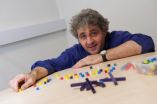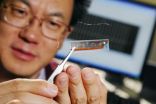(Press-News.org) Children with learning difficulties can benefit from being encouraged to find their own way to solve arithmetic problems, according to new research from the University of Strathclyde in Glasgow, Scotland.
A study by Dr Lio Moscardini, in Strathclyde's Faculty of Humanities & Social Sciences, found that children deal better with arithmetical problems if they can use their own intuitive strategies such as using number blocks, drawings or breaking an equation up into smaller, simpler parts- rather than being instructed in arithmetical facts and procedures.
All the teachers taking part in the study underwent professional development in children's mathematical thinking before introducing these ideas into their classrooms. Nearly all felt that their pupils had benefited from learning in this way- and several said they had previously underestimated the children's ability and potential.
Dr Moscardini, a specialist in additional support needs, said: "We found that pupils with learning difficulties were able to develop an understanding of arithmetic through engaging in these activities, without explicit prior instruction.
"When teachers have an insight into children's mathematical thinking they can use this knowledge to inform their teaching. The study also supported the view that maths learning isn't just about acquiring a series of skills but is about making sense of problems and building understanding."
The children's solutions, which they had not been taught in advance, included:
Answering a question about how many children are on a bus after a group gets on by representing two sets of children with cubes, drawings or fingers and joining the sets together
Splitting up the sum 48 + 25 by adding 40 to 20, then adding eight and five separately for the total of 73
Using context and language and modifying the way a problem is phrased. In one question, a boy having 14 stickers and giving six away was changed to him giving away "six of his stickers," allowing a pupil to follow the language of the problem to make sense of it
Some children were able to help out their fellow pupils and became increasingly able to recognise similarities between certain types of problem, enabling them to apply the same solutions.
The children were found to follow the same path in understanding adding, subtraction, multiplication and division as those who did not have the same difficulties.
INFORMATION:
The research paper, I Like It Instead of Maths, has been published in the British Journal of Special Education ,Volume 37, Issue 3, pages 130-138 (DOI: 10.1111/j.1467-8578.2010.00461.x)
Children find their own way to solve arithmetic problems
Research finds children deal better by using their own intuitive strategies
2010-11-09
ELSE PRESS RELEASES FROM THIS DATE:
Brain bleeding is common with aging, UCI study finds
2010-11-09
Irvine, Calif., Nov. 8, 2010 — A small amount of bleeding in the brain seems to be common among older individuals, according to a UC Irvine study.
Neurologist Dr. Mark Fisher and neuropathologist Dr. Ronald Kim found that cerebral microbleeds are highly prevalent in the aging brain – and not primarily products of stroke-related injury, hypertension or neurodegenerative diseases such as Alzheimer's, as had been thought.
"Prior work relied on brain imaging to show cerebral microbleeds," Fisher said. "But in this study, deep regions of the brain were closely examined under ...
Scientists discover how the songbird's brain controls timing during singing
2010-11-09
AUDIO:
New research that reveals the activity of nerve cells in a songbird's brain as the bird sings a specific song is helping scientists to understand how birds string together sets...
Click here for more information.
A team of scientists has observed the activity of nerve cells in a songbird's brain as it is singing a particular song. Dezhe Jin, an assistant professor in the Department of Physics at Penn State University and one of the study's authors, explained that ...
Stevens and TNO conduct joint experiments in Dutch Harbor for maritime security
2010-11-09
Hoboken, NJ – Stevens Institute of Technology and the Netherlands Organization for Applied Scientific Research (TNO) have recently conducted joint experiments in the Dutch Navy Harbor of Den Helder, where passive acoustic systems from both parties were combined. Initial experimental results are presented at the Waterside Security (WSS) 2010 conference. This important experimental campaign was financed by the Netherlands Ministry of Defence.
The collaboration between Stevens and TNO was initiated in early 2010 after recognizing a strategic opportunity to form a long-term ...
TB-drugome provides new targets for anti-tuberculosis drug discovery
2010-11-09
Researchers at the University of California, San Diego School of Medicine and the University of Leeds have linked hundreds of federally approved drugs to more than 1,000 proteins in Mycobacterium tuberculosis, the causative agent of tuberculosis (TB), opening new avenues to repurpose these drugs to treat TB.
The study was published Nov. 4 in PLoS Computational Biology.
"Tuberculosis is currently one of the most widely spread infectious diseases, with an estimated one-third of the world's population infected and between one and two million people dying each year from ...
DHA improves memory and cognitive function in older adults
2010-11-09
WASHINGTON, D.C., November 8, 2010 — A study published in the November edition of Alzheimer's & Dementia: The Journal of the Alzheimer's Association suggests that taking docosahexaenoic acid (DHA) may improve memory and learning in older adults with mild cognitive impairments. This is promising news for many aging Americans who are searching for options to maintain memory and support overall cognitive health.
The "Memory Improvement with Docosahexaenoic Acid Study" (MIDAS) was a randomized, double-blind, placebo-controlled study to evaluate the effects of DHA—the principle ...
Nanogenerators grow strong enough to power small conventional electronics
2010-11-09
VIDEO:
In the laboratory of Zhong Lin Wang at Georgia Tech, a blinking LCD signals the success of a five-year effort to power conventional electronic devices using nanoscale generators that harvest...
Click here for more information.
Blinking numbers on a liquid-crystal display (LCD) often indicate that a device's clock needs resetting. But in the laboratory of Zhong Lin Wang at Georgia Tech, the blinking number on a small LCD signals the success of a five-year effort ...
Single parenthood doesn't pay off for plants
2010-11-09
Durham, NC —Many plants can pollinate themselves and reproduce without the aid of a mate, thanks to having both male and female parts. But the short-term perks of being able to go it alone come with long-term costs, says a new study in the journal Science. The reason is because plants that can pollinate themselves are more prone to extinction, scientists say.
Flowering plants are incredibly creative when it comes to sex, said co-author Boris Igic, a biologist at the University of Illinois at Chicago. "Plants just can't walk over to potential mates like we do. Many species ...
Frequency of foot disorders differs between African-Americans and whites
2010-11-09
CHAPEL HILL, N.C. – Common foot disorders such as flat feet, corns and bunions are more prevalent among African Americans than in whites, a new study by University of North Carolina at Chapel Hill researchers has found.
African Americans in the study age 45 or older were three times more likely than whites of the same age to have corns or flat feet (medical name: pes planus). In people who were not obese, African Americans were twice as likely to have bunions (hallux valgus) and hammer toes than whites, said Yvonne M. Golightly, PT, PhD, lead author of the study, titled ...
Potential drug therapy for diabetic retinopathy under study
2010-11-09
One drug's startling ability to restore retinal health in the eyes of diabetic mice has researchers wanting to learn more about how it works and whether it might do the same for people.
"We want to know if this drug has the potential to block the visual devastation that can occur with diabetes," said Dr. Sylvia Smith, retinal cell biologist and co-director of the Vision Discovery Institute at the Medical College of Georgia. "That means we need to know more about how and when it is effective."
Diabetic retinopathy, the leading cause of blindness in working-age Americans, ...
Iron stimulates blooms of toxin-producing algae in open ocean, study finds
2010-11-09
SANTA CRUZ, CA--A team of marine scientists has found that toxin-producing algae once thought to be limited to coastal waters are also common in the open ocean, where the addition of iron from natural or artificial sources can stimulate rapid growth of the harmful algae. The new findings, reported this week in the Proceedings of the National Academy of Sciences, add to concerns about proposals to use iron fertilization of the oceans as a way to combat global warming.
Blooms of diatoms in the genus Pseudo-nitschia, which produce a neurotoxin called domoic acid, are a regular ...
LAST 30 PRESS RELEASES:
Alkali cation effects in electrochemical carbon dioxide reduction
Test platforms for charging wireless cars now fit on a bench
$3 million NIH grant funds national study of Medicare Advantage’s benefit expansion into social supports
Amplified Sciences achieves CAP accreditation for cutting-edge diagnostic lab
Fred Hutch announces 12 recipients of the annual Harold M. Weintraub Graduate Student Award
Native forest litter helps rebuild soil life in post-mining landscapes
Mountain soils in arid regions may emit more greenhouse gas as climate shifts, new study finds
Pairing biochar with other soil amendments could unlock stronger gains in soil health
Why do we get a skip in our step when we’re happy? Thank dopamine
UC Irvine scientists uncover cellular mechanism behind muscle repair
Platform to map living brain noninvasively takes next big step
Stress-testing the Cascadia Subduction Zone reveals variability that could impact how earthquakes spread
We may be underestimating the true carbon cost of northern wildfires
Blood test predicts which bladder cancer patients may safely skip surgery
Kennesaw State's Vijay Anand honored as National Academy of Inventors Senior Member
Recovery from whaling reveals the role of age in Humpback reproduction
Can the canny tick help prevent disease like MS and cancer?
Newcomer children show lower rates of emergency department use for non‑urgent conditions, study finds
Cognitive and neuropsychiatric function in former American football players
From trash to climate tech: rubber gloves find new life as carbon capturers materials
A step towards needed treatments for hantaviruses in new molecular map
Boys are more motivated, while girls are more compassionate?
Study identifies opposing roles for IL6 and IL6R in long-term mortality
AI accurately spots medical disorder from privacy-conscious hand images
Transient Pauli blocking for broadband ultrafast optical switching
Political polarization can spur CO2 emissions, stymie climate action
Researchers develop new strategy for improving inverted perovskite solar cells
Yes! The role of YAP and CTGF as potential therapeutic targets for preventing severe liver disease
Pancreatic cancer may begin hiding from the immune system earlier than we thought
Robotic wing inspired by nature delivers leap in underwater stability
[Press-News.org] Children find their own way to solve arithmetic problemsResearch finds children deal better by using their own intuitive strategies



